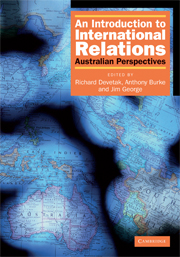Book contents
- Frontmatter
- Contents
- List of tables, figures and boxes
- List of contributors
- Preface and acknowledgments
- An introduction to international relations: the origins and changing agendas of a discipline
- 1 Theory and practice in Australian international relations: the search for identity and security
- Part 1 Theories of international relations
- Part 2 The traditional agenda: states, war and law
- 10 The modern state and its origins
- 11 Nationalism and war
- 12 Security
- 13 Arms control
- 14 The changing character of warfare
- 15 The ethics and laws of war
- 16 International law
- 17 International society and european expansion
- 18 Order and decolonisation in Southeast Asia
- 19 The cold war
- Part 3 The new agenda: globalisation and global governance
- Glossary of terms
- Bibliography
- Index
- References
19 - The cold war
from Part 2 - The traditional agenda: states, war and law
- Frontmatter
- Contents
- List of tables, figures and boxes
- List of contributors
- Preface and acknowledgments
- An introduction to international relations: the origins and changing agendas of a discipline
- 1 Theory and practice in Australian international relations: the search for identity and security
- Part 1 Theories of international relations
- Part 2 The traditional agenda: states, war and law
- 10 The modern state and its origins
- 11 Nationalism and war
- 12 Security
- 13 Arms control
- 14 The changing character of warfare
- 15 The ethics and laws of war
- 16 International law
- 17 International society and european expansion
- 18 Order and decolonisation in Southeast Asia
- 19 The cold war
- Part 3 The new agenda: globalisation and global governance
- Glossary of terms
- Bibliography
- Index
- References
Summary
Introduction
The Cold War was the most important feature of the international system in the second half of the twentieth century. The rivalry between the Soviet Union and the US shaped the contours of conflict and cooperation among states and peoples in the period between 1945 and 1991. Although the conflict did not drive all aspects of international relations, its force permeated every corner of the globe. From the Cape to Cairo, Sydney to Shanghai, the influence of geopolitical and ideological conflict was unmistakable. More importantly, the Cold War created rivalries and political fault lines which continue to be a central factor in international relations long after the conflict has passed.
The Cold War was a conflict between the Soviet Union and the US. The two powers who emerged from World War II as preeminent in world politics became engaged in a protracted global conflict which, though actual combat between them never eventuated, involved the largest and most destructive military arsenals in history. The two camps could destroy the entire planet thousands of times over with their nuclear weapons and each side's military was on a hair trigger for the conflict's duration. It was a dispute that was driven both by traditional concerns about security – each felt the other threatening to their survival and their interests – as well as by ideological antagonism. Both embodied universal ideologies which were predicated on the superiority of their own social system.
- Type
- Chapter
- Information
- An Introduction to International RelationsAustralian Perspectives, pp. 223 - 234Publisher: Cambridge University PressPrint publication year: 2007
References
- 1
- Cited by



